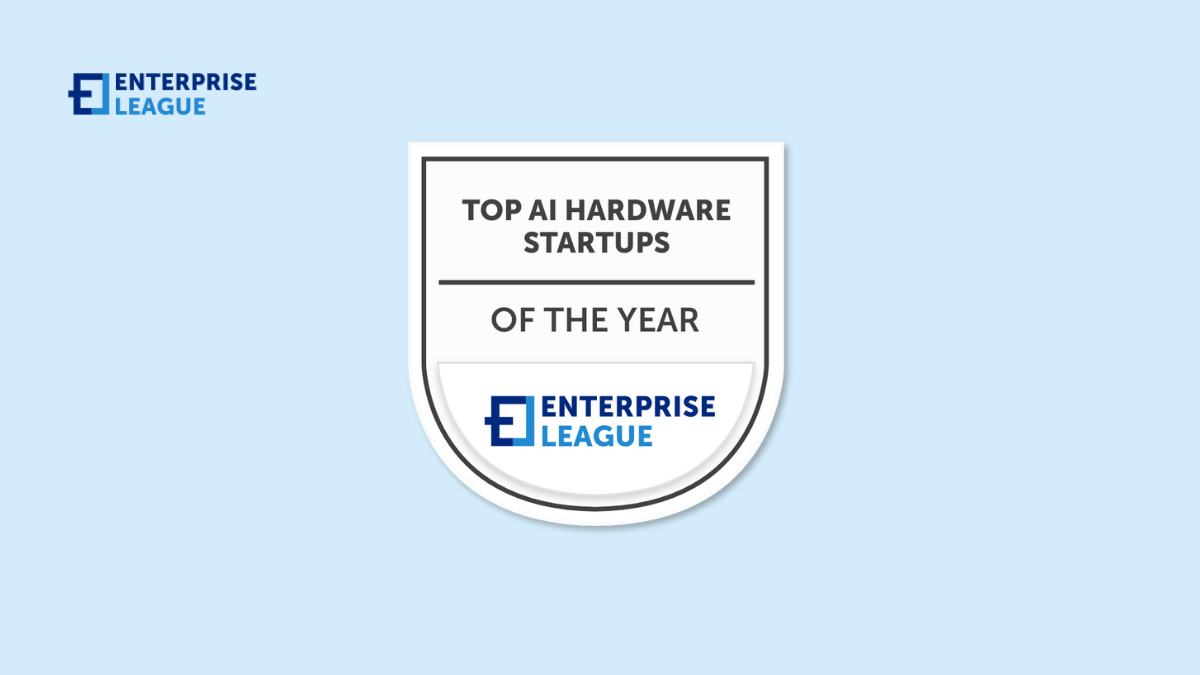Since AI has taken a big leap in the last few years, AI hardware startups are becoming a driving force when it comes to resolving the computational constraints that limit AI development These companies aren’t just creating alternatives to existing hardware, they’re fundamentally rethinking how AI computations should be processed at the silicon level.
With a market size predicted to reach USD 473.53 billion by 2033, AI hardware startups are bringing fresh perspectives and innovative architectures to the table.
What are AI hardware startups?
AI hardware startups are companies that develop specialized computer chips and processors specifically designed for artificial intelligence workloads. Think of it this way, if regular computer chips are like all-purpose kitchen knives that can do many jobs okay, AI hardware is like a professional chef’s knife that’s perfect for specific tasks. Well, these startups are creating chips that can handle AI tasks much better than regular computer chips, kind of like how a sports car performs better on a race track than a regular car.
Top AI hardware startups
Complete list of the most AI hardware startups that are worth knowing:
SambaNova
Founded in 2017, SambaNova is a startup that builds advanced hardware and software for AI and data analytics. Their technology helps companies process very large data sets and run complex machine-learning models efficiently.
Many traditional computing systems struggle with massive-scale AI development and modeling. SambaNova designs integrated systems from the chips up specifically for the unique demands of machine learning. This allows much faster data training and analysis versus other cloud services or enterprise servers.
Cerebras Systems
Founded in 2016, Cerebras Systems makes specialized computer hardware to speed up deep learning artificial intelligence. They manufacture the Cerebras CS-1 system for organizations working with complex neural networks. At the core of the CS-1 is the Wafer-Scale Engine (WSE), the largest computer processor ever built. The WSE provides immense computing power by covering an entire silicon wafer, enabling more cores and memory than multiple traditional chips combined.
This specialized hardware runs deep learning models orders of magnitude faster than legacy servers. The CS-1 system is designed expressly to optimize neural network training and inference used for AI applications like image recognition, prediction, and natural language processing.
Lightmatter
Founded in 2017, Lightmatter is a startup developing next-generation computer chips that are extremely fast and energy efficient. They aim to power advances in AI, computing, and greener technologies. Standard computer chips rely on silicon transistors. But Lightmatter uses photons that transmit data at lightspeed while using minimal electricity. This photonics-based architecture allows their chips to perform calculations faster using less energy.
By moving AI and supercomputing to Lightmatter’s optimized hardware, researchers can accelerate discoveries. Companies can drive innovations faster to market in areas like drug development, materials science, and automation. More powerful, efficient computing also supports environmental goals by curbing energy waste.
Celestial AI
Founded in 2020, Celestial AI is a technology company working on faster data transmission between computer chips and components. They are developing optical interconnect technology which uses light instead of electricity to transfer information. Inside computers, data gets passed around between processors, memory, storage, and more. Celestial AI’s optical links offer faster communication speeds between these components compared to traditional electrical connections. Beams of light can transmit more data faster.
Specifically, their technology enables quicker transmittal of data compute-to-compute, compute-to-memory, and even on-chip communication flows. By removing processing bottlenecks, overall performance improves. Their optical interconnects will enable things like better on-chip cache memory access.
SiMa.ai
Founded in 2018, SiMa.ai is a technology startup focused on machine learning hardware and software designed for edge devices. Edge refers to computing done locally on devices instead of in the cloud. SiMa.ai is creating an ultra-low-power chip and software platform specifically for machine learning on edge devices like smartphones, wearables, and sensors. Because it happens on-device, edge machine learning needs to function with minimal power to preserve battery life.
The SiMa.ai solution enables advanced AI features for things like image recognition, voice control, and predictive user experiences without quickly draining batteries. Their processors handle intensive machine learning in an efficient, compact form.
Enfabrica
Founded in 2020, Enfabrica is a company that builds high-performance networking hardware optimized for artificial intelligence (AI) systems. As AI models become more complex, the computer networks that connect them need to transmit huge amounts of data quickly and reliably. Enfabrica offers networking solutions designed specifically for machine learning infrastructure across organizations. Their products are tailored to handle the immense data demands of deep learning and advanced analytics applications.
The hardware Enfabrica develops focuses on fast data retrieval which allows AI algorithms to train faster. Their networking gear features innovative chip technology to speed information flows from storage drives to compute cores, especially in big data environments.
EdgeQ
Founded in 2018, EdgeQ is a tech startup that’s developing new computer chips specialized for 5G networks and artificial intelligence. Their chips integrate both 5G communications technology along AI computing power into a single piece of hardware. Today most AI uses cloud data centers which have lag times. EdgeQ aims to eliminate that delay by putting intelligent computing directly into the 5G network at the “edge.” This allows AI algorithms to tap real-time data and then control near-instant response systems. Self-driving vehicles are a key use case.
The EdgeQ chips feature fully customizable software so they can be programmed for different roles post-manufacture. This versatile architecture maximizes utilization whether chips support a wireless carrier site, factory IoT devices, or telemetry sensors. As needs evolve, software adjustments retool the hardware.
Esperanto Technologies
Founded in 2014, Esperanto Technologies creates fast, energy-efficient computer chips and servers that power artificial intelligence (AI) applications. They build their hardware using RISC-V, an open standard system different from commonly used architectures today like x86. RISC-V gives computer chip builders more freedom to customize designs for optimal performance. Esperanto uses this flexibility to enhance speed and efficiency specifically for machine learning and AI computing workloads. Their RISC-V chips deliver top results in processing complex neural networks and modeling used in AI.
While AI holds great promise, it requires powerful computers to crunch vast data for self-learning algorithms. Esperanto’s innovation increases access to that needed computing strength through affordable, high-speed hardware. Their systems help companies deploy AI sooner to unlock insights and automation from big data.
Kinara
Founded in 2022, Kinara makes artificial intelligence chips and software to enable real-time decision-making in smart devices and gateways. Their Ara edge AI processors optimize energy efficiency so responsive AI can run even on low-power gadgets like phones or WiFi routers.
The Kinara technology is built around a patented design they call Polymorphic Dataflow Architecture. This allows AI computing to adapt in real-time based on the situation rather than running predetermined models. Paired with their comprehensive Ara software toolkit, this hardware can accelerate all types of AI applications.
LeapMind
Founded in 2012, LeapMind is a technology company working on new kinds of chip designs to run artificial intelligence software more efficiently. Specifically, they are creating hardware optimized for neural networks a type of AI model that mimics how the human brain works. Neural networks require lots of computing power. LeapMind is inventing chip architecture that allows AI processing at low power, which is important for applications like self-driving cars or mobile robots. Their chips aim to handle complex neural net algorithms that demand high-speed parallel execution.
Traditional CPUs are not fit for such intensive AI computation. By building chips from the ground up for neural networks, LeapMind can maximize performance per watt. This allows AI to run on small devices without overheating while still supplying the speed that advanced machine learning requires.
BrainChip
Founded in 2011, BrainChip is a company that makes software and hardware to speed up artificial intelligence (AI) and machine learning. Their products help developers build and run complex AI apps and systems much faster.
BrainChip offers advanced AI processor chips that rapidly crunch data instead of relying only on graphics cards or cloud servers. This allows machine learning algorithms, neural networks, and smart vision features to function in real time without delays. Their optimized design allows fast, affordable AI capabilities to get embedded into devices like home electronics, medical tools, drones, and cars.
Ambient Scientific
Founded in 2017, Ambient Scientific builds ultra-low-power AI chips used in devices like smartphones, wearables, and smart home products. Their processors help give gadgets more intelligence to respond to voice commands, identify images, understand gestures, and more, all without draining batteries. Many companies want to add AI features like digital assistants to their products.
However current AI chip options use too much energy for small battery-powered devices. Ambient Scientific designed miniaturized neural network processors that enable on-device inferencing while using very minimal power. This allows companies to embed AI and machine learning into all kinds of mobile, portable, and battery-powered electronics. For example, a security camera could now recognize faces without needing an internet connection. Or wireless earbuds could respond to voice even if your phone is off.
Boulder AI
Founded in 2017, Boulder AI assists other businesses in implementing artificial intelligence (AI) and computer vision technology. They have expertise in AI software, hardware design, and deploying vision systems.
Boulder AI works with clients who want to integrate AI and cameras or sensors to improve operations, catch issues, or gain insights from visual data. Example applications could include automated quality control in factories, smart video security systems, or analyzing customer behavior in stores.
DataCrunch
Founded in 2020, DataCrunch aims to simplify access to specialized infrastructure for AI experimentation and deployment in Southeast Asia. By taking care of enabling performance hardware and software, The ML Cloud lets users focus efforts on machine learning while DataCrunch handles flexible provisioning and management.
For data scientists or companies without expansive local GPU infrastructure, The ML Cloud delivers flexible access to high-powered systems. Users can run machine learning frameworks like TensorFlow and PyTorch on-demand. Configurations scale from single GPU nodes to multi-node clusters to parallelize intensive computations.
Graphcore
Founded in 2016, Graphcore is trying to keep AI progress from stagnating. Their IPU hardware and Poplar software give ML engineers, academics, and forward-thinking companies a new foundation to achieve the next AI breakthrough or business insight. Graphcore is democratizing access to tomorrow’s computing power today. With wider reach, the boundaries of what’s possible with AI expand even faster.
Existing PCs and servers use computer processors that weren’t built with AI tasks in mind. Graphcore’s IPUs are specifically architected to handle how neural networks learn and make predictions via massive parallel calculation. That means IPUs can deliver better performance for AI applications.
Syntiant
Founded in 2017, Syntiant fits powerful machine learning technology into tiny, optimized semiconductors ideal for size and power-limited IoT gadgets. Their advanced local inference enables responsive “thinking at the edge.” Whether in kitchen gear, vehicles, wearables, or elsewhere, Syntiant’s edge AI gives products more responsiveness and intelligence.
Syntiant’s NDPs process speech and audio directly on the device instead of having to route it to the cloud first. This allows more immediate and natural interactions for tasks like activating smart home systems. Their chips reduce the costs and connectivity needs of integrating edge devices with cloud platforms.
Ambarella
Founded in 2004, Ambarella designs advanced video chip technology for cameras and high-resolution applications. They are a semiconductor company that develops specialized processing chips that enable high-definition and ultra-HD video compression as well as image processing.
Ambarella’s video compression chips help optimize streaming and recording of 4K and even 8K video feeds. This allows for super-sharp image capture with rich detail even with file sizes optimized for storage and sharing. The chips also enable smart image processing for features like computer vision and AI-powered analytics.
Mips
Founded in 1984, Mips built the way for RISC computing which is used across virtually all modern devices today. As one of the pioneering fabless semiconductor firms, Mips continues to shape technology’s future with processors that enhance communication, automation, entertainment, and more through computing everywhere around us.
Their chips power computation for things like engine systems, infotainment displays, mobile hotspots, routers, and smart home hubs. By optimizing chip performance per watt, Mips enables advanced functionality even for small, battery-powered gadgets. Mips processors are valued for their ability to deliver speed, security, and versatility through innovative instruction sets and microarchitectures. Their designs consistently push the boundaries of efficiency and real-world effectiveness.
Groq
Founded in 2016, Groq aims to propel innovation in AI by creating the underlying processor technology to enable the next generation of intelligent algorithms. As machine learning advances, it requires specialized hardware that can keep pace. Groq provides that foundation for transforming big data into meaningful insights faster. Their multi-core tensor streaming processors give both researchers and companies the rapid processing muscle that AI needs as it continues advancing.
The Groq chip cuts latency drastically so predictions happen in real-time. And by optimizing the hardware to only what’s essential for ML, their more streamlined design drives energy efficiency.
Habana Labs
Founded in 2016, Habana Labs makes specialized computer chips to speed up artificial intelligence systems. Their processors help companies train and run deep-learning models much faster. Habana’s main product is the Gaudi processor for AI training. It processes neural network data very efficiently. The Gaudi chip enables companies to train complex models in less time using fewer computing resources.
They also offer the Goya chip which focuses on efficient inference – making predictions from trained models. Goya allows deep learning systems to provide real-time results. For example, identifying objects in a video feed. Both the Gaudi and Goya processors deliver substantial AI performance gains over typical computer chips in data centers today. Habana’s hardware is designed from the ground up to accommodate advanced neural networks.
ProteanTecs
Founded in 2017, ProteanTecs aims to fundamentally change quality assurance for the connected world of electronics. By observing chips in action, their technology provides the feedback engineers need to create and maintain more robust systems. From spotting flaws sooner to extending lifespan with preventative intervention, ProteanTecs helps electronics deliver durability at scale through the power of data.
The UCT cloud platform translates sensor readings into predictive analytics that pinpoint when and where a chip may be degrading over time. Monitoring performance down to the transistor level allows unprecedented visibility into the health of critical server, data center, car, phone, and IoT electronics.
Conclusion
Since traditional CPU and GPU architectures are almost near their limits, these AI hardware startups are building new roads in computing. While competing against tech giants like NVIDIA and Intel is quite challenging, these startups’ specialized solutions and targeted AI applications are offering promising opportunities to disrupt the market and redefine how we build and deploy AI systems.
Discover more creative startups that might interest you:
- The best water management startups with smarter and sustainable water solutions.
- These oceanTech startups are solving ocean challenges with their unique approach.
- Modern lead generation startups pushing the boundaries in tech world.
- Innovative adtech and advertising startups redefining digital marketing strategies
- Amazing web development startups that revolutionize the way we build online platforms.
Related Articles
10 business tips for beginners to help you build a healthy brand
Starting a business can be quite the challenge especially if you’re all new to entrepreneurship. These business tips for beginners will help you set off on the right foot.
SEO writing: Five foolproof tips to secure you the first page
When it comes to SEO writing it’s more guessing and less evidence about what works and what doesn’t. Luckily, we know what can really help you reach the first page.
How to onboard a new employee: Tips for quick integration
Your guide to smoother employee onboarding where you will find practical strategies that help new hires feel welcome and become productive team members faster.
10 business tips for beginners to help you build a healthy brand
Starting a business can be quite the challenge especially if you’re all new to entrepreneurship. These business tips for beginners will help you set off on the right foot.
SEO writing: Five foolproof tips to secure you the first page
When it comes to SEO writing it’s more guessing and less evidence about what works and what doesn’t. Luckily, we know what can really help you reach the first page.








